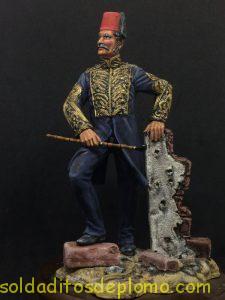GENERAL CHARLES G. GORDON EN KHARTOUM
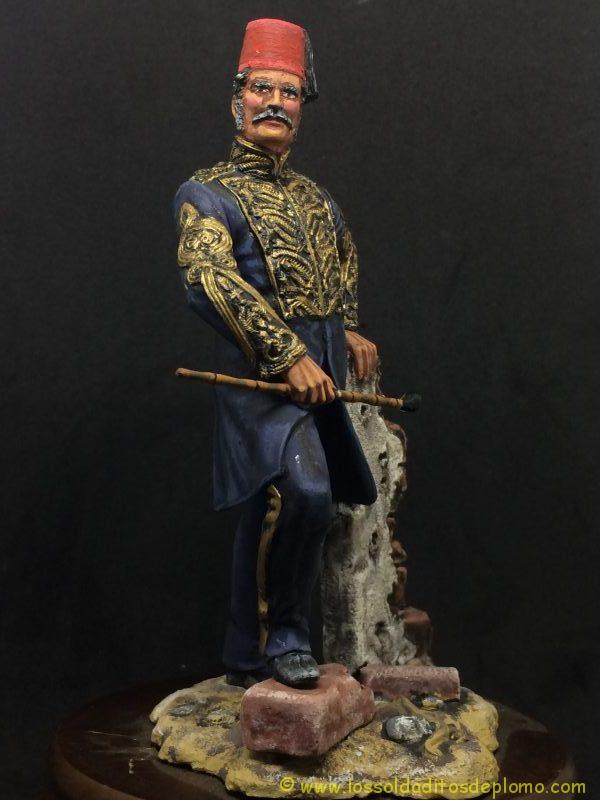
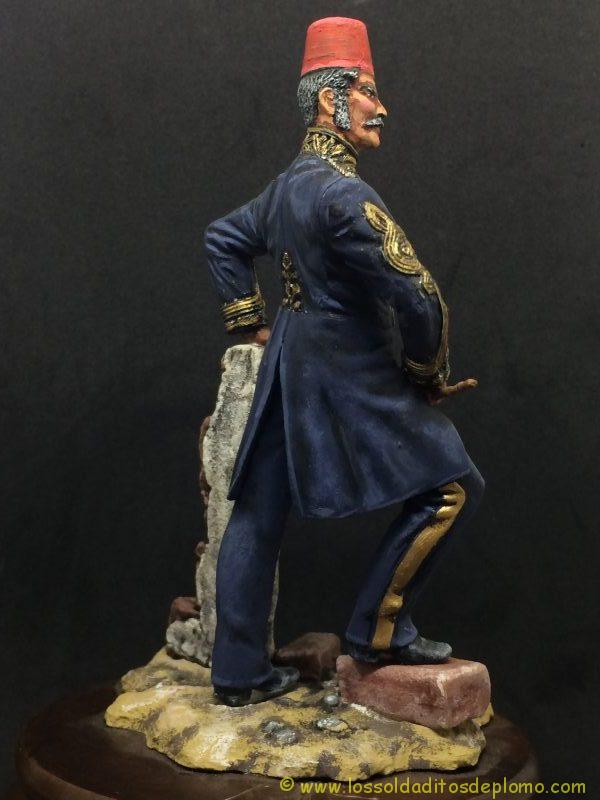
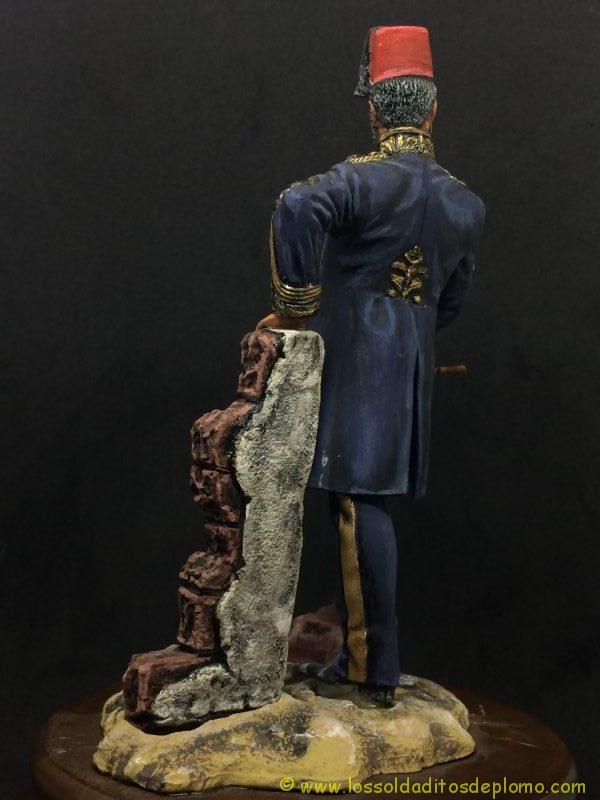
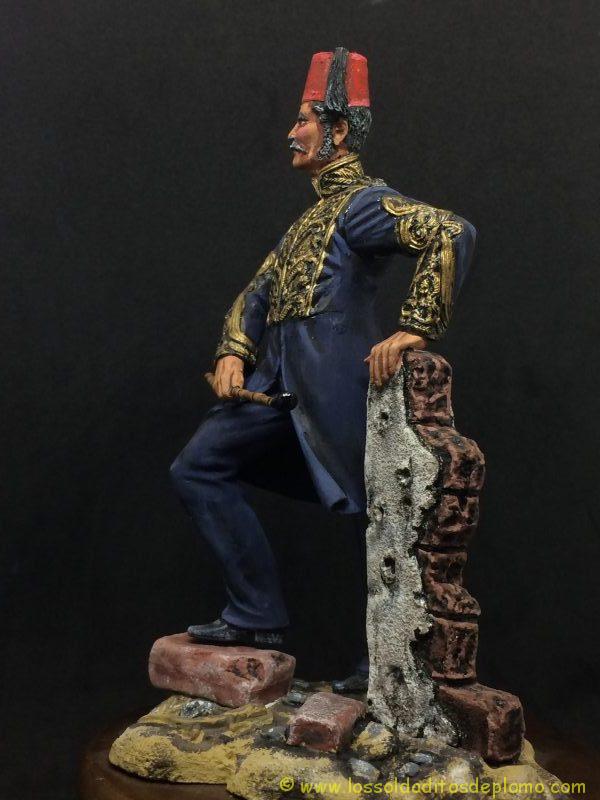
Charles George Gordon, CB (Londres, 28 de enero de 1833 – Jartum, 26 de enero de 1885), general británico, apodado Gordon Bajá y Gordon de Jartum, fue un oficial del Ejército Británico, del Cuerpo de Ingenieros Reales y administrador colonial. Se le recuerda sobre todo por sus campañas en China y en el norte de África.
Gordon nació en Woolwich, Londres, hijo del mayor general Henry William Gordon (1786-1865) y de Elizabeth (Enderby) Gordon (1792-1873). Fue educado en la escuela Fullands, en Taunton, Somerset, y en la Real Academia Militar de Woolwich. Fue comisionado en 1852 como teniente segundo del Cuerpo de Ingenieros Reales, completando su formación en Chatham. Fue ascendido a teniente en 1854.
A Gordon se le asignó primero la construcción de fortificaciones en Milford Haven, Pembrokeshire, Gales. Cuando comenzó la Guerra de Crimea, fue enviado al Imperio ruso, y llegó a Balaklava en enero de 1855. Se le destinó al sitio de Sebastopol y tomó parte en el asalto de la fortaleza desde el 18 de junio hasta el 8 de septiembre. Gordon también participó en la expedición a Kinburn, y volvió a Sebastopol al final de la guerra. Por sus servicios en Crimea, recibió la medalla de la guerra de Crimea y broche. A raíz de la paz, se le adjuntó a una comisión internacional para demarcar la nueva frontera entre el Imperio ruso y el Imperio otomano en Besarabia. Continuó la topografía, demarcando la frontera en Asia Menor. Gordon volvió a Gran Bretaña a finales de 1858, y fue designado como instructor en Chatham. Fue promovido a capitán en abril de 1859.
Después de Crimea, Gordon participó en la campaña de China de 1860 durante la Rebelión Taiping contra los emperadores. A la cabeza de un grupo de europeos, reorganizó el ejército imperial. Permaneció con las fuerzas británicas que ocupaban el norte de China hasta abril de 1862, cuando las tropas, bajo el mando del general William Staveley, se retiraron a Shanghái para proteger el enclave europeo de los rebeldes taiping que amenazaban la ciudad. Reconquistó las insurgentes Suzhou y Changzhou. El ejército de Gordon, «el ejército siempre victorioso», salvó a la dinastía manchú que parecía perdida y acabó rápidamente con los rebeldes.
En 1864, Gordon, colmado de honores y condecoraciones por los chinos, volvió al servicio del Reino Unido con el grado de Teniente Coronel.
En 1874, entró al servicio de Egipto con el grado de coronel del ejército egipcio, fue nombrado gobernador del sur de Sudán (África Ecuatorial) y llevó las fronteras egipcias hasta Gondokoro. Dimitió en 1879 a la vista de las dificultades con el nuevo Jedive Tewfik Pachá.
Después de servir en la India donde alcanzó el grado de Mayor General, regresó a Egipto en febrero de 1884 para salvar Jartum del asedio establecido por las tropas de Muhammad Ahmad, llamado el Mahdi (Nubia y el Sudán Oriental).
Charles Gordon tenía un carácter religioso y místico; se exaltó en esta misión. Creyó que podría hacer lo que había hecho anteriormente en China y salvar la causa del Reino Unido, esto es a sus ojos, de la civilización. Confiando en sí mismo y en el ascendiente que su energía le daba entre las poblaciones con las que se enfrentaba entró, ante el asombro de Europa, solo en Jartum.
Gordon organizó la defensa de Jartum, con un sitio que comenzó el 18 de marzo de 1884. Los británicos habían decidido abandonar Sudán, pero estaba claro que Gordon tenía otros planes, y la opinión pública reclamaba que se le enviaran refuerzos. No fue hasta agosto cuando el gobierno decidió dar los pasos correspondientes para ayudar a Gordon, pero los refuerzos británicos no estuvieron listos hasta noviembre.
La intervención de Gordon solo sirvió para prolongar la resistencia de la ciudad. Al año siguiente, en 1885, los derviches tomaron la ciudad y Gordon fue decapitado. Cuando los refuerzos ingleses llegaron descubrieron que la ciudad había sido tomada y que Gordon había muerto dos días antes. Después de decapitarlo, los soldados de Mahdi Mohammed Ahmed exhibieron su cabeza clavada en una pica.
Gordon fue encarnado por el actor Charlton Heston en el filme Khartoum (Basil Dearden, 1966).
Charles George Gordon, CB (London, January 28, 1833 – Khartoum, January 26, 1885), British general, nicknamed Gordon Pasha and Gordon of Khartoum, was an officer of the British Army, the Corps of Royal Engineers and colonial administrator. He is remembered most of all for his campaigns in China and North Africa.
Gordon was born in Woolwich, London, son of Major General Henry William Gordon (1786-1865) and Elizabeth (Enderby) Gordon (1792-1873). He was educated at the Fullands School, at Taunton, Somerset, and at the Royal Military Academy at Woolwich. He was commissioned in 1852 as second lieutenant of the Corps of Royal Engineers, completing his training in Chatham. He was promoted to lieutenant in 1854.
Gordon was first assigned to the construction of fortifications in Milford Haven, Pembrokeshire, Wales. When the Crimean War began, he was sent to the Russian Empire, and arrived in Balaklava in January 1855. He was assigned to the siege of Sevastopol and took part in the assault on the fortress from June 18 to September 8. Gordon also participated in the expedition to Kinburn, and returned to Sevastopol at the end of the war. For his services in the Crimea, he received the Crimean War medal and brooch. Following peace, he was attached to an international commission to demarcate the new frontier between the Russian Empire and the Ottoman Empire in Bessarabia. Continued topography, demarcating the border in Asia Minor. Gordon returned to Britain in late 1858, and was appointed as an instructor in Chatham. He was promoted to captain in April 1859.
After the Crimea, Gordon participated in the China campaign of 1860 during the Taiping Rebellion against the emperors. At the head of a group of Europeans, he reorganized the imperial army. It remained with the British forces that occupied the north of China until April of 1862, when the troops, under the command of General William Staveley, retreated to Shanghai to protect the European enclave from the Taiping rebels that threatened the city. He reconquered the insurgents Suzhou and Changzhou. Gordon’s army, “the always victorious army,” saved the Manchu dynasty that seemed lost and quickly ended the rebels.
In 1864, Gordon, filled with honors and decorations by the Chinese, returned to the service of the United Kingdom with the rank of Lieutenant Colonel.
In 1874, he entered the service of Egypt with the rank of colonel of the Egyptian army, was appointed governor of southern Sudan (Equatorial Africa) and led the Egyptian borders to Gondokoro. He resigned in 1879 in view of the difficulties with the new Jedive Tewfik Pacha.
After serving in India where he reached the rank of Major General, he returned to Egypt in February 1884 to save Khartoum from the siege established by the troops of Muhammad Ahmad, called the Mahdi (Nubian and Eastern Sudan).
Charles Gordon had a religious and mystical character; He was exalted in this mission. He believed that he could do what he had done previously in China and save the cause of the United Kingdom, that is, in his eyes, of civilization. Trusting in himself and in the ascendancy that his energy gave him among the populations he faced, he entered, to the astonishment of Europe, only in Khartoum.
Gordon organized the defense of Khartoum, with a siege that began on March 18, 1884. The British had decided to leave Sudan, but it was clear that Gordon had other plans, and the public demanded that reinforcements be sent to him. It was not until August that the government decided to take the necessary steps to help Gordon, but the British reinforcements were not ready until November.
The intervention of Gordon only served to prolong the resistance of the city. The following year, in 1885, the dervishes took the city and Gordon was beheaded. When the English reinforcements arrived they discovered that the city had been taken and that Gordon had died two days before. After beheading him, the soldiers of Mahdi Mohammed Ahmed exhibited his head nailed to a pike.
Gordon was played by actor Charlton Heston in the film Khartoum (Basil Dearden, 1966).

